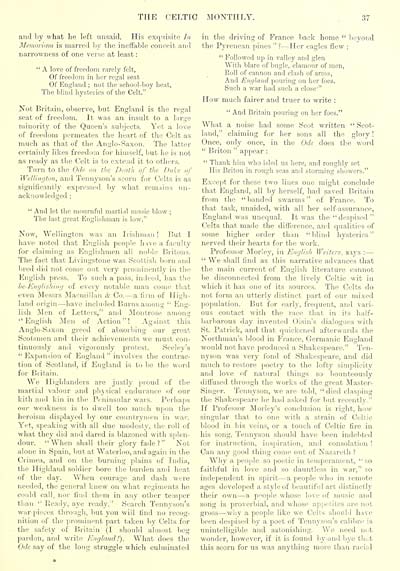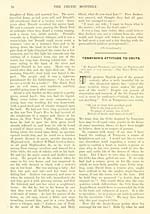Blair Collection > Celtic monthly > Volume 1, 1893
(51)
Download files
Complete book:
Individual page:
Thumbnail gallery: Grid view | List view

THE CELTIC MONTHLY.
and by what lie left unsaid. His exquisite Tn
Memorial n is marred by the ineffable conceit and
narrowness of one verse at least :
" A love of freedom rarely felt,
Of freedom in her regal seat
Of England ; not the school-boy heat,
The blind hysteiies of the Celt."
Not Britain, observe, but England is the regal
seat of freedom. It was an insult to a large
minority of the Queen's subjects. Yet a love
of freedom permeates the heart of the Celt as
much as that of the Anglo-Saxon. The latter
certainly likes freedom for himself, but he is not
as ready as the Celt is to extend it to others.
Turn to the 0,/e on the Death of the Lhike of
Wellington, and Tennyson's scorn for Celts is as
significantly expressed by what remains un-
acknowledged :
" And let the mournful martini music blow ;
The hist great Englishman is low.''
Now, Wellington was an Irishman ! But I
have noted that English people have a faculty
tor claiming as Englishmen all noble Britons.
The fact that Livingstone was Scottish bom ami
bred did not come out- very prominently in the
English press. To such a pass, indeed, has the
be-linglisking of every notable man come that
even Messrs Macmillan & Co. — a firm of High-
land origin — have included Burns among " Eng-
lish Men of Letters," and Montrose among
"English Men of Action"! Against this
Anglo Saxon greed of absorbing our great
Scotsmen and their achievements we must con-
tinuously and vigorously protest. Seeley's
" Expansion of England " involves the contrac-
tion of Scotland, if England is to be the word
for Britain.
We Highlanders are justly proud of the
martial valour and physical endurance of our
kith and kin in the Peninsular wars. Perhaps
our weakness is to dwell too much upon the
heroism displayed by our countrymen in war.
Yet, speaking with all due modesty, (he roll of
what they (lid and dared is blazoned with splen-
dour. "When shall their glory fade V Not
alone in Spain, but at Waterloo, and again in the
Crimea, and on the burning plains of India,
tin; Highland soldier bore the burden and heat
of the day. When courage and dash were
needed, the general knew on what regiments he
could call, nor find them in any other temper
than " Ready, aye ready. ' Search Tennyson's
war pieces through, but you wiil find no recog-
nition of the prominent part taken by Celts for
the safely of Britain (I should almost beg
pardon, and write England/). What does the
Oik say of the long struggle which culminated
in the driving of France back home " beyond
the Pyrenean pines " I — Her eagles flew :
" Followed up in valley ami glen
With blare of bugle, clamour of men,
Roll of cannon and clash of arms,
And England pouring on her foes.
Such a war had such a close-"
How much fairer and truer to write :
" And Britain pouriug on her foes."
What a noise had some Scot written " Scot-
land," claiming for her sons all the glory !
Once, only once, in the Ode does the word
" Briton " appear :
" Thank him who isled us here, and roughly set
His Briton in rough seas and storming showers."
Except for these two lines one might conclude
that England, all by herself, had saved Britain
from the "banded swarms" of France. To
that task, unaided, with all her self-assurance,
England was unequal. It was the "despised "
Celts that made the difference, and qualities of
some higher order than "blind hysterics"
nerved their hearts for the work.
Professor Morley, in English Writers, says : —
" We shall find as this narrative advances that
the main current of English literature cannot
be disconnected from the lively Celtic wit in
which it has one of its sources. The (Jells do
not form an utterly distinct part of our mixed
population. But for early, frequent, and vari-
ous contact with the race that in its half-
barbarous day invented Oisin's dialogues with
St. Patrick, and that quickened afterwards the
Northman's blood in France, Germanic England
would not have produced a Shakespeare." Ten-
nyson was very fond of Shakespeare, and did
much to restore poetry to the lofty simplicity
and love of natural things so bounteously
diffused through the works of the great Master-
Singer. Tennyson, we are told, "died clasping
the Shakespeare he had asked for but, recently "
If Professor Morley's conclusion is right, how
singular that to one with a strain of Celtic
blood in his veins, or a touch of Celtic fire in
his song, Tennyson should have been indebted
for instruction, inspiration, and consolation !
Can any good thing come out of Nazareth i
Why a ] pie so poeiie iii temperament, "so
faithful in love and so dauntless in war," so
independent in spirit — a people who in 1 emote
ages developed a style of beautiful art distinctly
their own — a people whose love of music and
song is proverbial, and whose appetites are not
gross — why a people like we Celts should have
been despised by a poet of Tennyson's calibre is
unintelligible and astonishing. We need not
wonder, however, if it is found by-and-bye (bat
this scorn for us was anything more than racial
and by what lie left unsaid. His exquisite Tn
Memorial n is marred by the ineffable conceit and
narrowness of one verse at least :
" A love of freedom rarely felt,
Of freedom in her regal seat
Of England ; not the school-boy heat,
The blind hysteiies of the Celt."
Not Britain, observe, but England is the regal
seat of freedom. It was an insult to a large
minority of the Queen's subjects. Yet a love
of freedom permeates the heart of the Celt as
much as that of the Anglo-Saxon. The latter
certainly likes freedom for himself, but he is not
as ready as the Celt is to extend it to others.
Turn to the 0,/e on the Death of the Lhike of
Wellington, and Tennyson's scorn for Celts is as
significantly expressed by what remains un-
acknowledged :
" And let the mournful martini music blow ;
The hist great Englishman is low.''
Now, Wellington was an Irishman ! But I
have noted that English people have a faculty
tor claiming as Englishmen all noble Britons.
The fact that Livingstone was Scottish bom ami
bred did not come out- very prominently in the
English press. To such a pass, indeed, has the
be-linglisking of every notable man come that
even Messrs Macmillan & Co. — a firm of High-
land origin — have included Burns among " Eng-
lish Men of Letters," and Montrose among
"English Men of Action"! Against this
Anglo Saxon greed of absorbing our great
Scotsmen and their achievements we must con-
tinuously and vigorously protest. Seeley's
" Expansion of England " involves the contrac-
tion of Scotland, if England is to be the word
for Britain.
We Highlanders are justly proud of the
martial valour and physical endurance of our
kith and kin in the Peninsular wars. Perhaps
our weakness is to dwell too much upon the
heroism displayed by our countrymen in war.
Yet, speaking with all due modesty, (he roll of
what they (lid and dared is blazoned with splen-
dour. "When shall their glory fade V Not
alone in Spain, but at Waterloo, and again in the
Crimea, and on the burning plains of India,
tin; Highland soldier bore the burden and heat
of the day. When courage and dash were
needed, the general knew on what regiments he
could call, nor find them in any other temper
than " Ready, aye ready. ' Search Tennyson's
war pieces through, but you wiil find no recog-
nition of the prominent part taken by Celts for
the safely of Britain (I should almost beg
pardon, and write England/). What does the
Oik say of the long struggle which culminated
in the driving of France back home " beyond
the Pyrenean pines " I — Her eagles flew :
" Followed up in valley ami glen
With blare of bugle, clamour of men,
Roll of cannon and clash of arms,
And England pouring on her foes.
Such a war had such a close-"
How much fairer and truer to write :
" And Britain pouriug on her foes."
What a noise had some Scot written " Scot-
land," claiming for her sons all the glory !
Once, only once, in the Ode does the word
" Briton " appear :
" Thank him who isled us here, and roughly set
His Briton in rough seas and storming showers."
Except for these two lines one might conclude
that England, all by herself, had saved Britain
from the "banded swarms" of France. To
that task, unaided, with all her self-assurance,
England was unequal. It was the "despised "
Celts that made the difference, and qualities of
some higher order than "blind hysterics"
nerved their hearts for the work.
Professor Morley, in English Writers, says : —
" We shall find as this narrative advances that
the main current of English literature cannot
be disconnected from the lively Celtic wit in
which it has one of its sources. The (Jells do
not form an utterly distinct part of our mixed
population. But for early, frequent, and vari-
ous contact with the race that in its half-
barbarous day invented Oisin's dialogues with
St. Patrick, and that quickened afterwards the
Northman's blood in France, Germanic England
would not have produced a Shakespeare." Ten-
nyson was very fond of Shakespeare, and did
much to restore poetry to the lofty simplicity
and love of natural things so bounteously
diffused through the works of the great Master-
Singer. Tennyson, we are told, "died clasping
the Shakespeare he had asked for but, recently "
If Professor Morley's conclusion is right, how
singular that to one with a strain of Celtic
blood in his veins, or a touch of Celtic fire in
his song, Tennyson should have been indebted
for instruction, inspiration, and consolation !
Can any good thing come out of Nazareth i
Why a ] pie so poeiie iii temperament, "so
faithful in love and so dauntless in war," so
independent in spirit — a people who in 1 emote
ages developed a style of beautiful art distinctly
their own — a people whose love of music and
song is proverbial, and whose appetites are not
gross — why a people like we Celts should have
been despised by a poet of Tennyson's calibre is
unintelligible and astonishing. We need not
wonder, however, if it is found by-and-bye (bat
this scorn for us was anything more than racial
Set display mode to: Large image | Transcription
Images and transcriptions on this page, including medium image downloads, may be used under the Creative Commons Attribution 4.0 International Licence unless otherwise stated. ![]()
| Early Gaelic Book Collections > Blair Collection > Celtic monthly > Volume 1, 1893 > (51) |
|---|
| Permanent URL | https://digital.nls.uk/75841948 |
|---|
| Description | Vol. I. |
|---|---|
| Shelfmark | Blair.54 |
| Attribution and copyright: |
|
| Description | A selection of books from a collection of more than 500 titles, mostly on religious and literary topics. Also includes some material dealing with other Celtic languages and societies. Collection created towards the end of the 19th century by Lady Evelyn Stewart Murray. |
|---|
| Description | Selected items from five 'Special and Named Printed Collections'. Includes books in Gaelic and other Celtic languages, works about the Gaels, their languages, literature, culture and history. |
|---|

